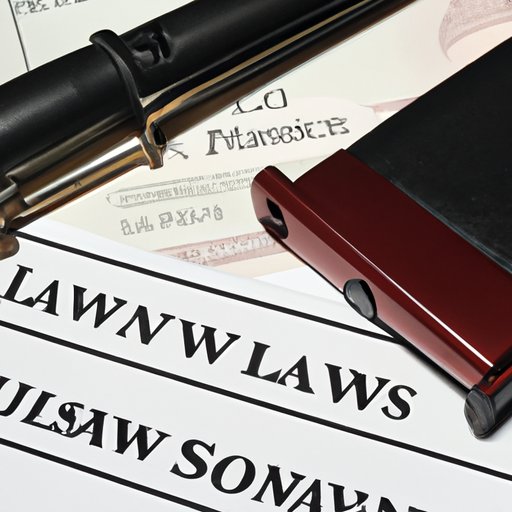
Introduction
Buying a gun can be a daunting task, especially for beginners. There’s a lot to consider, from navigating gun laws to understanding different types of guns and paperwork. In this article, we’ll break down everything you need to know to purchase a gun with confidence.
The Beginner’s Guide: What You Need to Buy a Gun
Before purchasing a gun, there are a few absolute basics to consider. First, you must be of legal age, which is typically 18 years old for long guns and 21 for handguns. Additionally, you will need a valid government-issued ID, such as a driver’s license. It’s also helpful to have a general understanding of gun terminology and concepts, such as the different types of ammunition and the proper way to handle a gun. As a first-time buyer, it’s a good idea to start with a smaller gun and seek the advice of an experienced gun owner or sales associate before making a purchase.
Navigating Gun Laws: A Checklist for What You Need
Gun laws can vary by state, so it’s important to research laws in your specific area. However, there are several federal laws that apply across the country. For example, all gun buyers must complete a background check through the National Instant Criminal Background Check System (NICS). Additionally, it is illegal for certain people to own guns, such as those with a felony conviction or a history of domestic violence. To remain compliant with gun laws, it’s important to research and understand them thoroughly.
Get Armed: The Process of Purchasing a Gun and What’s Required
Once you have a basic understanding of gun ownership and the associated laws, it’s time to purchase your gun. The general process involves selecting a gun and completing necessary paperwork, such as a federal form 4473. There are a variety of guns to choose from, including pistols, revolvers, rifles, and shotguns. When selecting a gun, consider its intended use, such as home defense or hunting. Additionally, different types of paperwork may be required depending on the type of gun and state you live in. For example, some states require a waiting period or a permit to purchase a handgun.
Behind the Counter: A Sales Associate’s Perspective on What You Need to Buy a Gun
Sales associates play an important role in the gun-buying process. They can help answer questions and provide valuable insight into different types of guns and their uses. Common questions from buyers include whether to buy a new or used gun, how to properly maintain a gun, and what types of accessories may be helpful. To make the most of your experience in a gun store, do some research ahead of time and come prepared with questions.
The Legal Loopholes: The Bare Minimum You Need to Buy a Gun
While gun laws are in place to keep people safe, there may be potential loopholes that some people exploit. For example, it’s possible to purchase a gun from a private seller without a background check. Additionally, it’s possible to purchase a gun in one state and transport it to another state without notifying any authorities. To remain lawful while purchasing a gun, it’s important to research and understand all applicable laws and regulations.
The Costs of Getting Armed: A Comprehensive List of Everything You Need to Buy a Gun
The costs of purchasing and owning a gun can add up quickly. In addition to the cost of the gun itself, you may need to purchase ammunition, a gun safe, cleaning supplies, and accessories such as holsters and sights. Additionally, there may be ongoing costs associated with regular maintenance and range fees. To save money, consider purchasing used equipment or buying in bulk. It’s also important to budget for these expenses to avoid unexpected costs.
Conclusion
Buying a gun can be a complex process, but with the right knowledge and preparation, you can do so with confidence. Remember to research gun laws in your area, seek advice from experienced gun owners or sales associates, and budget for associated costs. Additional resources to consider include gun safety courses and online forums for gun owners. By being prepared and informed, you can enjoy safe and responsible gun ownership.




